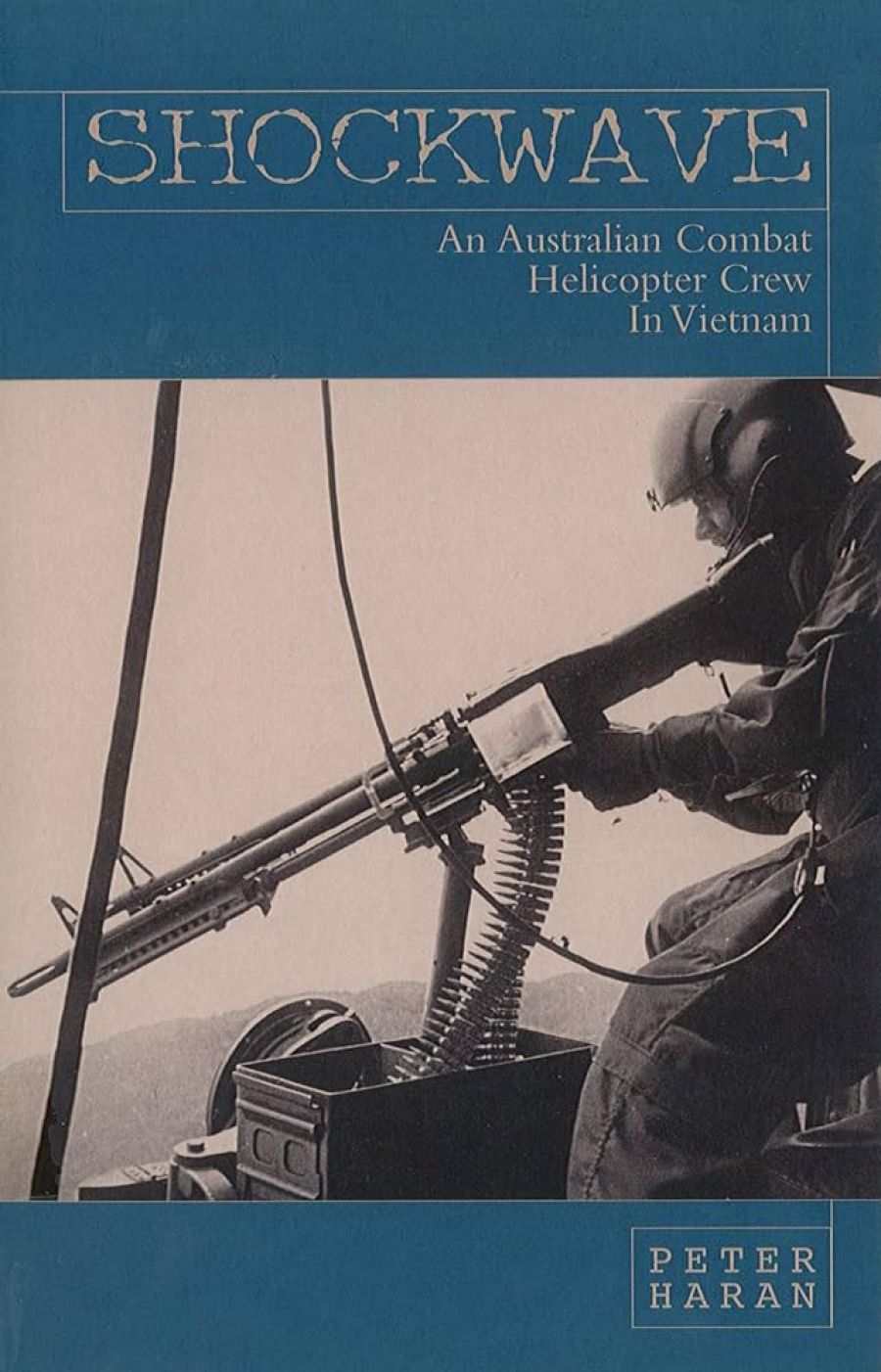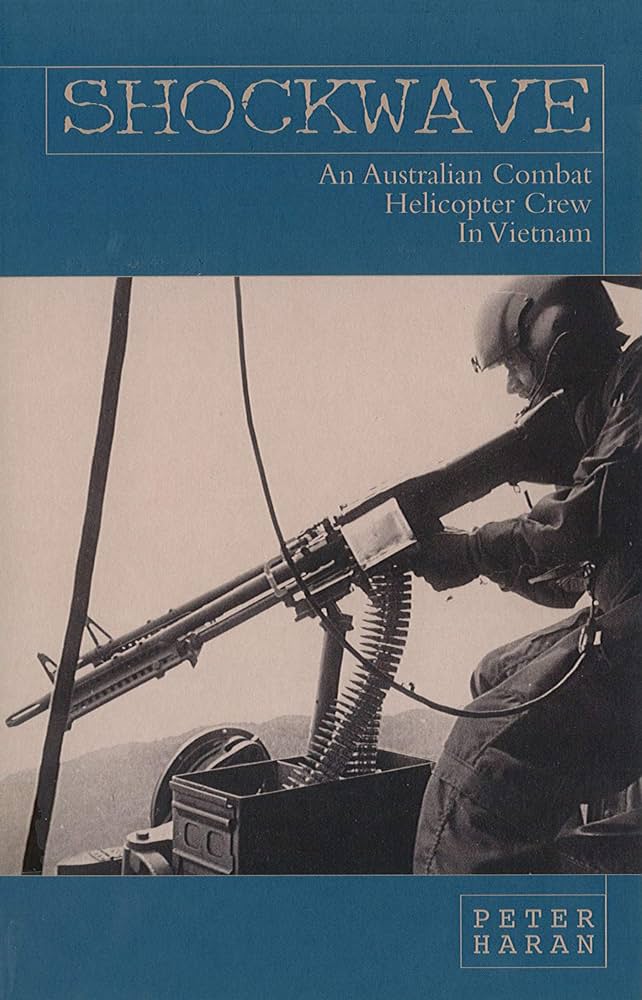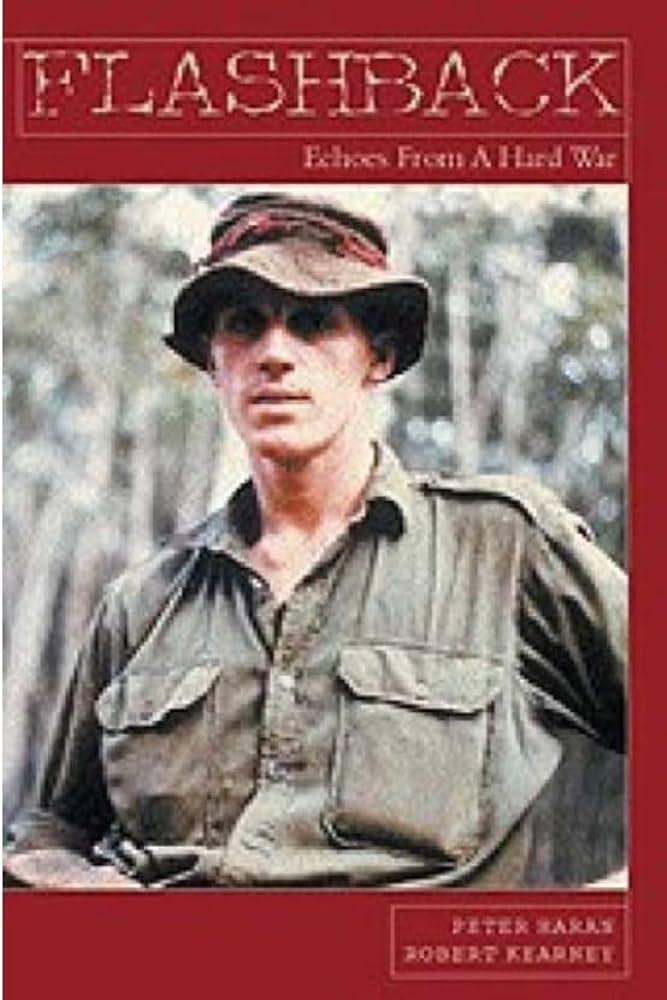
- Free Article: No
- Contents Category: War
- Custom Article Title: Prophylactic Talk
- Review Article: Yes
- Article Title: Prophylactic Talk
- Online Only: No
- Custom Highlight Text:
War stories are never extrinsic to war. The us-and-them plots, domino theories and governing metaphors, the operational jargon and vast naming schemes, even the post-hoc synopses (we won, we should have won, another win like that and we’re finished): these are not patterns laid over something real; they stream from the enabling code.
Between 1966 and 1971 the Australian Task Force Vietnam administered its own war in Phuoc Tuy, a province south-east of Saigon. The Australians had their own allocation of enemy (D445 local guerrilla battalion and elements of the NVA 5th Division), their own style (US gear and fire-support, Vietnamese patrol tactics) and, of course, their own story. They were the latest Anzacs. Right?
- Book 1 Title: Shockwave
- Book 1 Subtitle: An Australian combat helicopter crew in Vietnam
- Book 1 Biblio: New Holland, $19.95 pb, 212 pp
- Book 1 Cover Small (400 x 600):

- Book 1 Cover (800 x 1200):

- Book 2 Title: Flashback
- Book 2 Subtitle: Echoes from a hard war
- Book 2 Biblio: New Holland, $24.95 pb, 237 pp
- Book 2 Cover Small (400 x 600):

- Book 2 Cover (800 x 1200):

- Book 3 Title: The Year I Said Goodbye
- Book 3 Biblio: Wakefield Press, $27.50 pb, 269 pp
- Book 3 Cover Small (400 x 600):

- Book 3 Cover (800 x 1200):

In the prologue to Flashback: Echoes from a Hard War, Peter Haran and Robert Kearney explain: ‘We have written their stories simply because they were diggers who served and suffered, and they embody the true character of the Anzac.’ Underneath this claim lies a heartbroken 1970s syllogism. If everyone loves the Anzacs, and we are Anzacs, how is it that no one loves us? To be faintly reviled was one thing; to be left unloved was really intolerable.
Peter Winter did his tour in 1970–71 as an infantry platoon commander with 7RAR. The Year I Said Goodbye is a selection of the letters he wrote home to his wife (mostly) and parents. Written on a smeary knee in the rain, these primary documents amount to an intimate reportage. We are not given his wife’s side of the correspondence. Her letters are reified in survival rituals.
I’m afraid that after I read your letters I have to burn them so somewhere deep in the jungle of South Vietnam, the remnant of your letter lies in the brown dust. Actually, I use the ash to blacken my face and help with my camouflage, so probably all your dear words are embedded in the pores of my skin ... how romantic.
This gets to the heart of Winter. He is mild, earnest, sensitive and happily self-conscious. He enjoys writing and often pauses between C-rations and the nightly ambush to analyse, from afar, the family finances or to knock out a poem. On R&C at the Peter Badcoe Club, Vung Tau, he reads books, drinks Coke and attempts to suntan his pimples to oblivion. In the jungle – patrolling, eating, smoking, waiting – the detailed banality of war is given its true pace and modulation by Winter’s letter-writing discipline. He writes on days of action and inaction. When nothing happens, as it so often does, he returns in detail to the nothing. One day, watching the radio operators work to keep their handsets dry with condoms, he observes: ‘What I mean is, have you ever held a really important conversation with your boss, talking through a prophylactic?’ Actually, Peter, in Canberra this appears to have become standard practice.
Shockwave and Flashback are a different kind of book, titles in a Vietnam series that includes Trackers and Crossfire. These narrative reconstructions were written by men who were there and tell the stories of men they knew. Sourced from a combination of oral history, military records and memory, the anecdotes and character profiles are given life with a certain amount of dramatic caulk. The fiery brevity of the episodes is matched by their titles: from Shockwave, ‘In the Hot Seat’, ‘Breathing Fire’, ‘Taking Fire’, ‘Hot Insertion’ and ‘Going Hot’.
Flashback covers the story of seven soldiers in the period from 1966 to 1972 and uses first-person interludes to fix the action in the relevant soldier’s voice. Shockwave follows an Australian helicopter gunship crew in similar style, but with more gung-ho verve:
When he was 200 metres from the enemy position he squeezed the tit with a two-second burst, sending shards and fragment [sic] of rock flying up like shrapnel ... then he punched out a rocket, for God’s sake. Goodall swung away with such skill you’d believe his skids took a nog’s hat off. We lowed and were going down the hill, picking up speed. Goodall was on the bloody blower again – did he ever give it a break? ‘Get right in this time. Do it properly or fuck off!’
In the reading of such reconstruction, one experiences a kind of formal discomfort. The genre tends not to strike a happy medium between the art of fiction and the found-object verity of reportage, and a number of episodes in Flashback and Shockwave miss both.
The war in Phuoc Tuy was essentially a form of low-yield hunting. Against the superior gear, mobility and fire-support of the Australians, the Vietcong deployed a single piece of devastating magic – they disappeared. Constantly, incredibly, hauntingly, by night and at great cost, they maintained the powerful mystique of the insubstantial enemy. After a night battle in which ‘Bushranger’ gunships had laid down heavy fire, the soldiers from 3RAR conduct a morning sweep to find: ‘No enemy bodies, no flesh or blood, just one solitary Vietcong rubber sandal.’ And it is approaching the ineffable that these books find their limit. On the death of a comrade: ‘Then the rage had subsided into grief and loss. Finally he had felt numb, empty.’ On camaraderie itself:
The rites of passage might involve punching the suitcases out of each other after a gutful in the boozer, arguing and slapping each other around over a card game and illegal piss-up in the tents at Nui Dat, and detecting each other’s weaknesses but never exploiting them beyond good-humoured banter.
The best war books rely on a chemistry of access and writing skill – Michael Herr’s Dispatches (1977) is the Vietnam model – yet here the mix is weighted heavily at the soldiering end, and the prose is not fresh or strange enough. But there are telling scenes. Assault Pioneer Trevor Lynch was left blind by a savage peppering of shrapnel from a booby trap on Nui Thi Vai. Back home, he was cared for by his mother until she died. After that he lived in a Blind Welfare Hostel, his trousers perforated with fallen cigarette ash. Robert ‘Dogs’ Kearney, co-author of Flashback, visited him when he was dying of liver cancer:
Dogs, I don’t have too many regrets, but there is one.’
‘What’s that, Trev?’
‘I’d like to have had the chance to get married and have a family of my own. Do you think I’ll get another go?’
Tears were streaming down my face. I could only squeeze his hand and croak, ‘Shit, mate, you’re special. Next time you’ll be rich, have lots of kids and, who knows, maybe you’ll even be a movie star.’
Trevor slipped back onto his pillow. ‘I hope you’re right, Dogs. I really didn’t get much of a go, did I, mate?’
At cruising altitude in the global culture, the sky is like the sky in Vietnam, overwritten with contrails of American hard-ware and padded out with the bumph of American pamphlets. It’s possible, in such conditions, to assume that Australian stories about Vietnam are to be found in some pale appendix to the US war. In fact, the war in Phuoc Tuy is one of our stories, and it probably deserves more of a go.


Comments powered by CComment